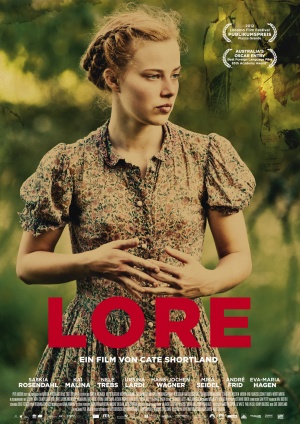What a pleasant change, I’ve actually watched a movie and really, really liked it. I’d say it was certainly the best wartime movie I’ve seen in a long while. Lore is a German/Australian/UK co-production. Spoken in German, with German actors and subtitled in English. It’s based on Ruth Seiffert’s highly acclaimed novel The Dark Room. Or, to be more precise, on one of the three interlinked stories in the book.
Lore is the eldest daughter of a prominent Nazi functionary. Indoctrinated with the ideology, she blindly loves her father and the Führer, follows every order without questioning and takes everything she’s ever been taught to be the absolute truth. The movie begins at the end of the war. Her parents are in distress, something has happened but they won’t tell their children. The family flees to a holiday home in the country where people treat them aggressively. Lore has no clue what is going on. She knows her parents are hiding something. The father leaves them, and shortly afterwards the mother leaves too. She is giving herself up and goes to prison unsolicited. Before she leaves she tells Lore that the Führer is dead. Everything is lost. Lore has to take her four siblings, one of them is just a baby, and walk in direction of Hamburg where her mother lives.
The movie follows the children on their difficult journey towards Hamburg. It shows how difficult and dangerous it is for them. They risk starvation, rape, being killed or captured. They have to cross three different sectors, the US, the Russian and the UK sector. Even though they are only children, they are suspected and interrogated. At one point a young man starts to follow them. He carries papers and pretends being their older brother. This makes all of their lives easier.
Lore is more than a road movie, it delicately portrays the total disenchantment of a young girl. On their journey they are not only confronted with severe deprivations but they learn the truth about their beloved father and the Führer. Everything Lore believed in was built on a lie.
I’ve never seen a movie, which focussed on the children of high Nazi officers. I never wondered what became of them after the war. The movie shows what a long and painful process it was to learn the truth.
The story as such is quite gripping and the way it was told was masterful. I haven’t seen any of Cate Shortland‘s other movies but she’s a film director I’ll keep in mind. Lore was beautifully filmed and the score, written by Max Richter, enhanced the gloomy atmosphere of the film. The atmosphere and the mood was probably what I liked best: lyrical, melancholic and gloomy.
I’m not surprised Lore has won so many prizes and been nominated for many awards. I’d say it’s the first 5/5 movie I’ve seen this year. Don’t miss it.
Has anyone seen the film?





